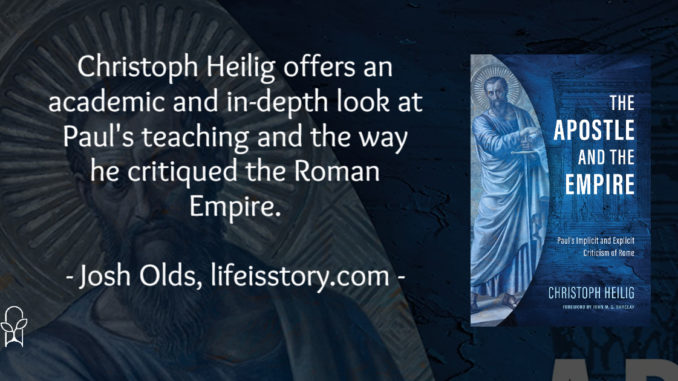
Published by Eerdmans on November 22, 2022
Goodreads
Was Paul silent on the injustices of the Roman Empire? Or have his letters just been misread?
The inclusion of anti-imperial rhetoric in Paul’s writings has come under scrutiny in recent years. Pressing questions about just how much Paul critiques Rome in his letters and how publicly critical he could have afforded to be have led to high-profile debates—most notably between N. T. Wright and John M. G. Barclay.
Having entered the conversation in 2015 with his book Hidden Criticism?, Christoph Heilig contributes further insight and new research in The Apostle and the Empire, reevaluating the case for Paul hiding his criticism of Rome in the subtext of his letters. Heilig argues that scholars have previously overlooked passages that openly denounce the empire—for instance, the “triumphal procession” in 2 Corinthians, which Heilig discusses in detail by drawing on a variety of archaeological data.
Furthermore, Heilig takes on larger issues of theory and methodology in biblical studies, raising significant questions about how interpreters can move beyond outdated methods of reading the New Testament toward more robust understandings of the ways ancient texts convey meaning. His groundbreaking work is a must-read for Pauline scholars and for anyone interested in how one of Christianity’s most important teachers communicated his unease with the global superpower of his day.
One pressing question in New Testament—and particularly Pauline—literature is the relationship between early Christianity and the Roman Empire. We know from history that Rome’s initial indifference to Christianity gave way to persecution and then eventually turned to syncretism under Constantine, but what did Jesus, Paul, and the first generation of Christians say or think about their imperial overlords? The question is an important one because it could provide modern believers with a guide to interacting with our own modern political systems. How much did Paul critique Rome and how strong or explicit were his critiques? In The Apostle and the Empire, Christoph Heilig offers an academic and in-depth look at Paul’s teachings, concluding that Paul was not as silent in his critique against the Empire as some have thought.
First and foremost, this is an academic work. Heilig references both N.T. Wright and John M.G. Barclay heavily and assumes that readers will be familiar with their work before launching into his. Heilig is, in some ways, a moderating force between the two—tempering Wright’s position that leans toward Paul’s political activism while suggesting that Barclay’s view isn’t quite strong enough. But Heilig doesn’t just explicate and moderate, he goes further and deeper than either Barclay or Wright, to argue that scholars on both sides of the debate have overlooked important passages—the triumphal procession of 2 Corinthians, in particular—in the discussions of Paul’s view of empire.
The Apostle and the Empire builds on Heilig’s 2015 book Hidden Criticism?, revealing the results of a half-decade of further study and research on the topic. Heilig’s conclusion is that while Paul might not have been as openly political as some would have liked for him to have been, there is both implicit and explicit criticism of the Roman Empire in Paul’s writings. Further, Paul’s lack of strong explicit criticism is not evidence of Paul condoning the empire, but rather understanding that the promulgation of the Kingdom of God was the strongest criticism of Caesar’s empire that he could give.
I’m not quite enough of a scholar to appreciate this book to its fullest, but it’s obvious that Heilig has a passion for the topic. He navigates the passages with ease, shows excellent understanding of others working in this area, and adds significantly to the conversation. While I would have liked to have seen some thoughts on how his perspective can affect our modern political theologies, that was not Heilig’s primary goal. Well-researched and well-argued, The Apostle and the Empire aptly makes the case that Paul was indeed a vocal critic of the Roman Empire, but was careful to criticize in such a way that refrained from being needlessly inflammatory or detracted from the preaching of the Kingdom of God.
